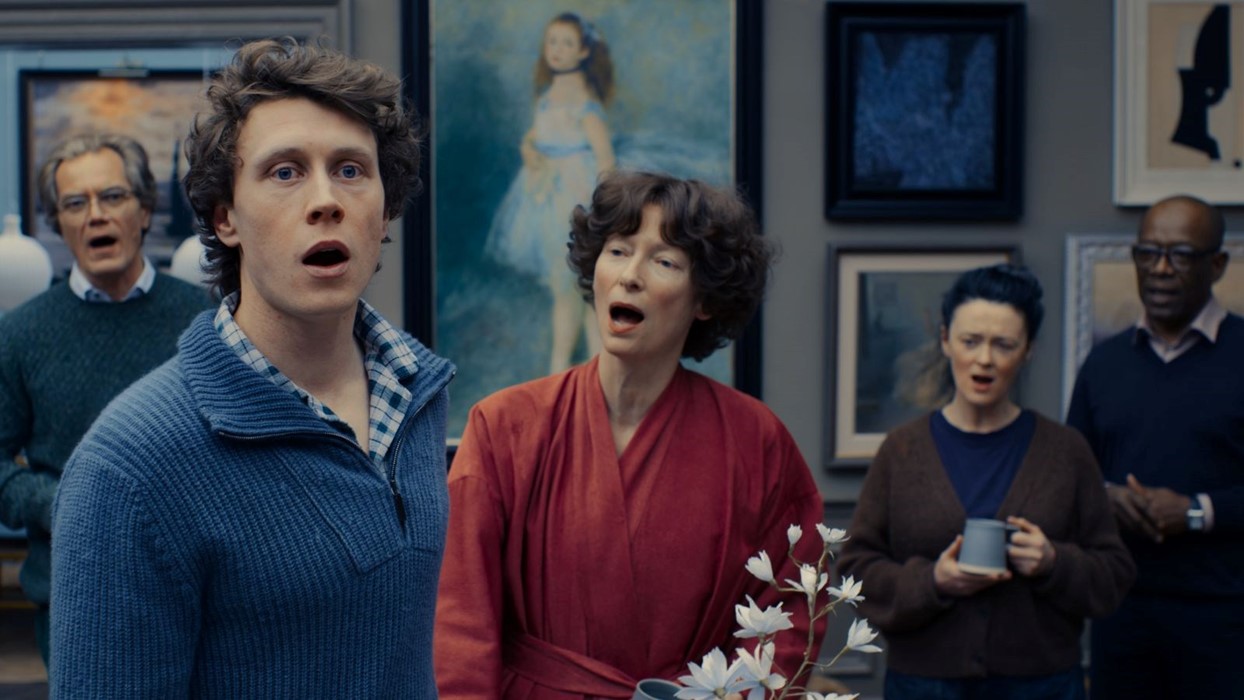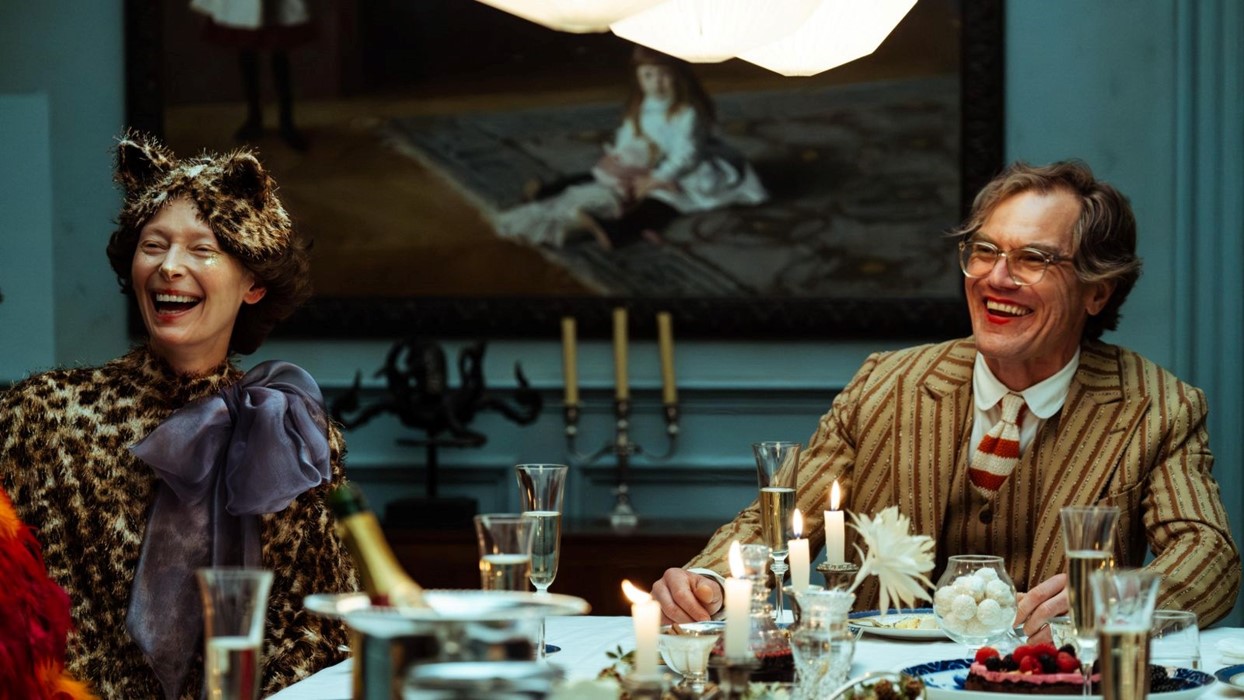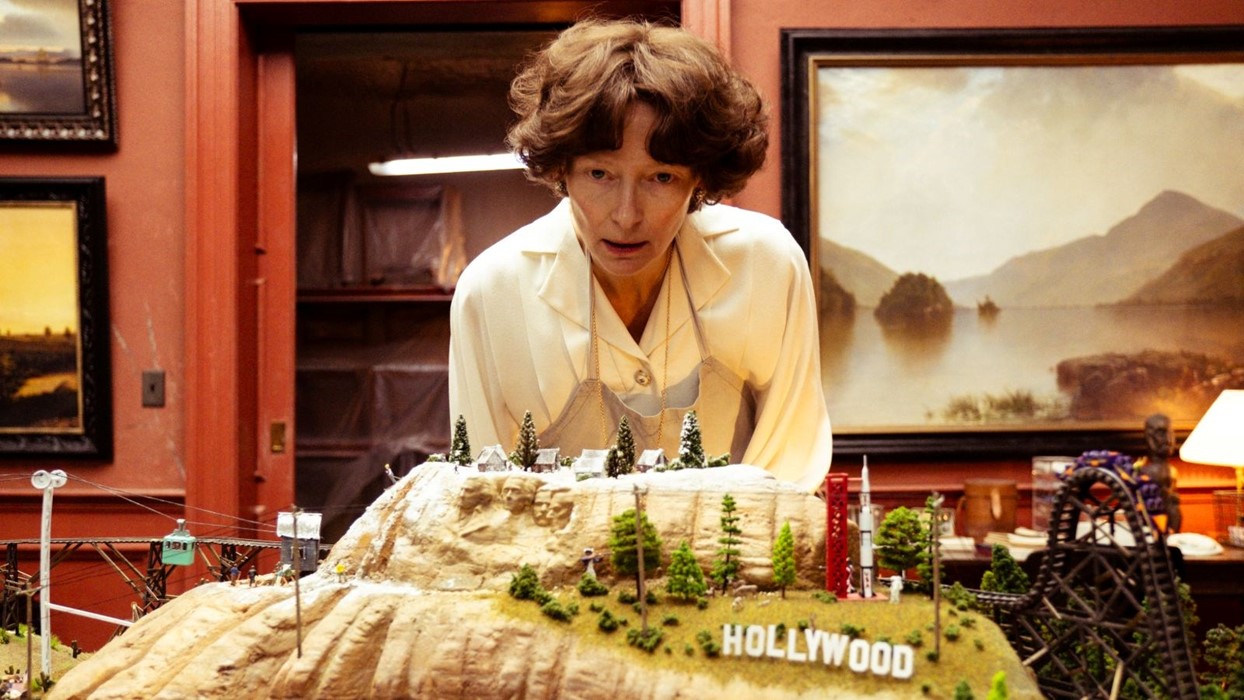As his post-apocalyptic musical satire is released, Joshua Oppenheimer talks about his iconic documentary on the Indonesian genocide, The Act of Killing, and crafting characters who are unable to face reality
Where do the most insulated people in the world shelter from Armageddon? In Joshua Oppenheimer’s post-apocalyptic musical satire The End, a wealthy family and their immediate dependents have built a tense domestic paradise in a secure bunker deep in a salt mine after world-ending fossil fuel disasters. The grown-up son (George MacKay) has swallowed his family narrative: that his father (Michael Shannon) was a just, capable energy baron, his mother (Tilda Swinton) was a world-class ballet dancer, and that the only safe space is inside the traditions and hierarchy of their compound. Suddenly, a stranger (Moses Ingram) appears on their doorstep, unwittingly disrupting a carefully curated peace at the end of all things.
The End is Oppenheimer’s first fiction film, but his documentary work – namely, his celebrated examination of the Indonesian genocide, The Act of Killing – poses similar thematic questions: “What is it like to survive atrocities only because you perpetrated them?” In The Act of Killing, Anwar Congo relives his death squad glory days in garish, Hollywood-esque recreations that massage his ego but reveal their inherent falsity. By contrast, the characters in The End delay the realisation that they are not the rightful inheritors of the Earth by bursting into Jacques Demy-inspired song.
Oppenheimer, talking to us over Zoom, draws a direct line between the two films. “In all the dramatisations, we’re not looking for the camera. I am not looking to escape into a fantasy with the character, I’m actually looking for the cracks when the revisionism stops working. That’s very much how the songs work in The End. As the excuses start to unravel because truth enters their bubble, they shift mode from rationalising to romanticising. Unable to face the reality behind the veil of excuses, they struggle desperately to sentimentalise their lives, their past, what they’ve done, through music. We don’t escape into these beautiful, luminous lies that [composer] Joshua Schmidt has written, a kind of musical fantasy number. We bear witness to these characters as they struggle and fail to reassure themselves in song that all is well.”
Even if The End has formal and thematic ties to the films that made him an arthouse sensation, Oppenheimer’s pivot to musical satire has surprised and confounded many since its premiere last year. But the director doesn’t see himself as a changed artist after making it. “I remember after The Look of Silence [a subdued, devastating companion film to The Act of Killing], I was doing a dialogue with Werner Herzog, and Werner kept using the word ‘storyteller’. And I said, ‘I don’t think of myself as a storyteller.’ And Werner said, ‘It’s because you made documentaries. If you make a fiction film, you will.’ Then he encouraged me to make a fiction film, and then I made The End. And I still don’t think of myself as a storyteller. I just don’t identify with the word. I see myself as creating a dreamlike, immersive experience, which I invite you to feel first and think about afterwards. All the dream fragments that we banish away as we wake up in the morning, they come back and are revealed to be what we actually are.”

Other than Herzog, other films and artists pepper our conversation: Oppenheimer cast Swinton after recalling her guilt-ridden turn in Michael Clayton; he compares Shannon’s performance to a rageful, self-hating Jimmy Stewart; he was put in touch with 1917 star George MacKay via Sam Mendes; he is surprised when I compare The End to Luis Buñuel. Most pertinent is our discussion of Jonathan Glazer, whose incisive and asphyxiating drama The Zone of Interest climaxes with Auschwitz commandant Rudolf Höss (Christian Friedel) dry retching, as if his body is trying to expel an intangible rejection of his violent work. It’s a choice lifted directly from The Act of Killing, where Anwar Congo is hit by the same bodily impulse. “I encountered that film through that moment,” Oppenheimer says. “It was an interview with the actor who plays Höss [Christian Friedel] describing how they watched the end of The Act of Killing to calibrate that performance. I was immensely honoured by that.”
Oppenheimer was struck by this discovery because it happened just after he and Shannon attempted something similar for a scene near the finale of The End, where the father verges on confronting the barbarity of his life in song. “We talked about The Act of Killing, which he’d only actually seen while we were rehearsing the film. He asked, ‘Would it be interesting to explore that kind of physical reaction?’ I thought, ‘Whatever happens in this moment, I want it to be truthful.’ I didn’t want [Michael] to copy what Anwar did there, and I don’t think Michael is the type of actor who ever would. Also, honestly, as an author, I thought that kind of intertextuality with a key moment in my own work would diminish the moment in The End, make it smaller. People would be pulled out of the film to think about another scene.”

The director’s reluctance to copy The Act of Killing’s standout moment helps distinguish The End as a work that speaks the same psychological language, if not the exact same words, as Anwar’s story. “I suppose we talked about that moment and tried to learn from it, and asked ourselves, what’s really happening to Anwar there? Why does that happen to him? So it was fascinating to me to read about another actor also trying to learn from that moment. But then when I saw [The Zone of Interest] I thought, ‘Oh, it’s incredibly faithful.’ I didn’t put them up next to each other. I just [saw] the way he was retching and trying to control himself; [it] was really precisely done.”
The End is out in UK cinemas now.
